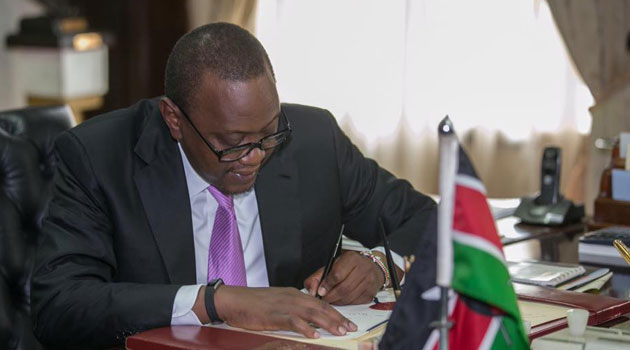
The Division of Revenue Act seeks to provide for the equitable provision of revenue raised nationally between the national and county governments in 2017/2018 financial year/FILE
NAIROBI, Kenya, 21st June 2017, President Uhuru Kenyatta today at State House Nairobi, signed 9 Bills into law including the Division of Revenue Bill 2017.
Other Bills assented to by the President include the Finance Bill (2017), Supplementary Appropriation Bill (2017), Insurance Amendment Bill (2017), Health Bill (2015), Hydrologist Bill (2016), the Clinical Officers Bill (2016), Basic Education Amendment Bill (2016) and National Coroners Service Bill (2016).
The Division of Revenue Act seeks to provide for the equitable provision of revenue raised nationally between the national and county governments in 2017/2018 financial year.
The National Government share is Kshs. 1,238,343,840,000 and the County allocation total revenue is Kshs 345,681,081,499 which is 36.95% of the revenue nationally raised.
The National Government share includes Kshs 3.4 billion which is a special grant to the National Health Insurance Fund for free maternal healthcare.
The conditional allocation to County Governments is for leasing medical equipment, level five hospitals, construction of county headquarters and rehabilitation of youth polytechnics.
The Finance Act seeks to amend the law relating to various taxes and duties. It also seeks to amend the following laws among others.
The Betting, Lotteries and Gambling Act (Cap. 131) to increase the tax rates from the currents rates to 35%.
The Kenya Revenue Authority Act (Cap.469) to include the newly introduced laws: the Tax Procedures Act, 2015, the Value Added Tax Act, 2013, the Miscellaneous Fees and Levies Act, 2016 and Excise Duty Act, 2015 as part of the revenue laws administered by the Kenya Revenue Authority.
The Stamp Duty Act (Cap.480) to provide for tax neutrality for Islamic financial products to favourable compete with similar conventional products in Kenyan markets. The Sacco Societies Act (Cap.490B) to define “deposits” and “deposit taking sacco business” to take on board the principles of Islamic law in the Act as a form of recognition of Islamic saccos.
The Supplementary Appropriation Act seeks to authorize the issue of certain sums of money out of the Consolidated Fund and their application towards the service of the year ending 30th June, 2017 and to appropriate those sums for certain public services.
In particular the Act proposes the issuance of Kshs 31 billion to be appropriated to carter for among other things the development expenses for Basic Education programmes, University Education, Power Generation and Transmission, Agriculture, Environment management and protection, National Referral and Specialized Services and Water Resources Management.
The Insurance Amendment Bill was submitted by the Cabinet Secretary for the National Treasury in line with the proposals announced in the Budget for 2017/2018.
The objective of the Bill which is now a law seeks to amend the Insurance Act (Cap. 487) to harmonize the provision following a recent amendment to the Act.
In particular, it seeks to amend section 41 of the
Insurance Act in order to prescribe the assets that shall not be included for the purposes of determining an insurer’s capital adequacy.
Further, it seeks to amend the Insurance Act in order to define what admitted liabilities are, a term which Insurance Act had not defined.
The Health Act, establishes a unified health system, to coordinate the inter-relationship between the national government and county government health systems.
This will help in regulating healthcare services and healthcare service providers, health products and health technologies.
The new Health Law seeks to define how national health policy shall be formulated, implemented and coordinated between the two levels of government.
In particular, it seeks to among other things achieve the establishment of a National Health System which shall progressively realize the right to the highest attainable standard of health, including the right to healthcare services and reproductive health.
The Hydrologist Act provides for the registration of hydrologists. It establishes a Hydrologist Registration Board which will be responsible for among other things, regulate, coordinate and oversee the practise of hydrology.
The law prescribes the qualifications for registration as hydrologist and licensing of a person wishing to practise as a hydrologist. It also provides for restrictions on use of titles by non-registered persons.
The Clinical Officers Act provides for the training, registration and licensing of clinical officers.
It establishes the Clinical Officers Council of Kenya which shall be responsible for advising the government on policy matters relating to clinical medicine practise among other things.
The Basic Education Amendment Act amends basic education Act placing the responsibility of providing free, sufficient and quality sanitary towels to every girl child registered and enrolled in a public basic education institution and has reached puberty, on the government.
The law says the government shall provide a safe and environmental sound mechanism for disposal of the sanitary towels.
It further states that the annual estimates shall make provisions for all the estimated expenditure for the financial year concerned and in particular shall provide conditional capitation funds to facilitate the acquisition of sufficient and quality sanitary towels to every girl child registered and enrolled in a public basic education institution who has reached puberty.
The Coroners Service Act establishes a National Coroners Service and provides for its powers and functions.
It seeks to among other things to provide for the investigation of reportable deaths in order to determine the identities of the deceased persons, the times and dates of their deaths and the manner and cause of their deaths.
The Bills were presented to the President for his signature by the National Assembly Speaker Justin Muturi. Also present were Majority Leader of the National Assembly Aden Duale, Head of Public Service and Chief of Staff Joseph Kinyua, National Treasury Cabinet Secretary Henry Rotich, National Treasury Principal Secretary Kamau Thugge, Solicitor General Njee Muturi and Clerk of the National Assembly Michael Sialai.



































